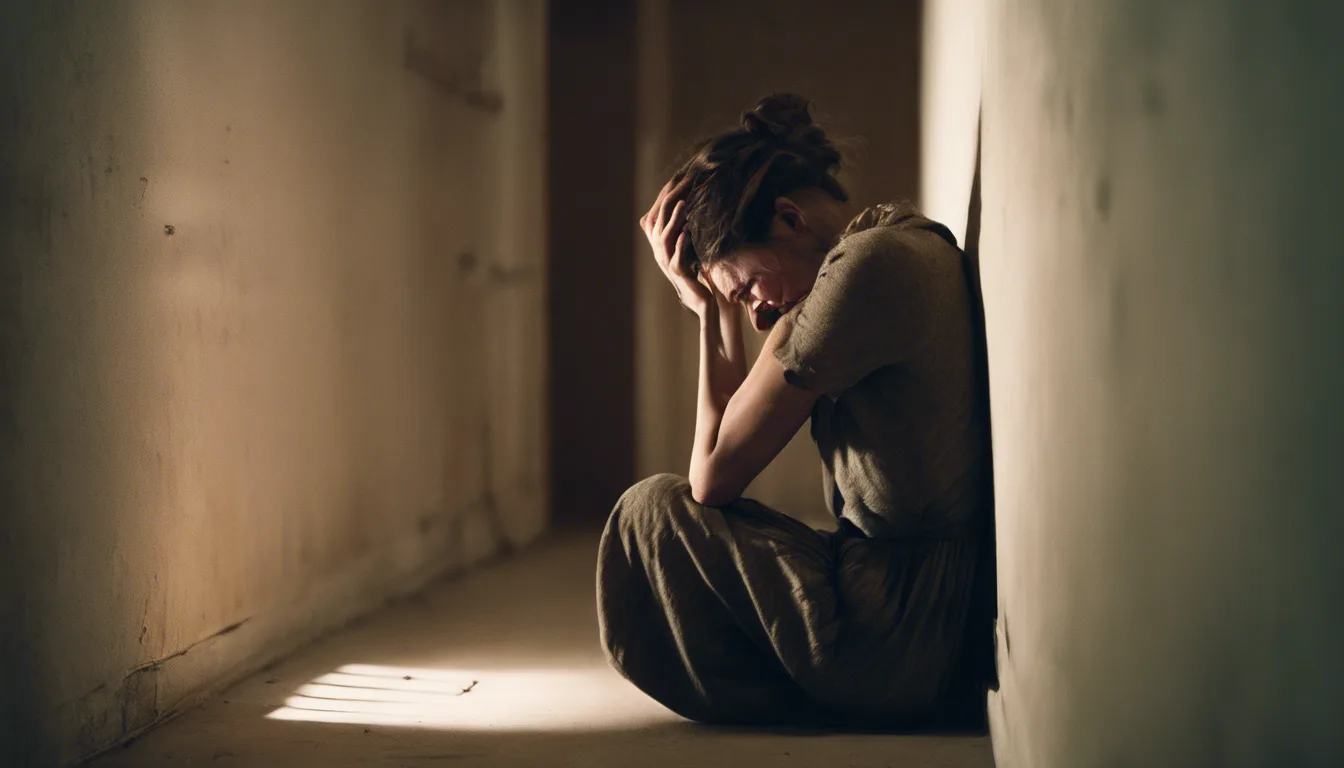8 Demographics of People Who Might Dream of Being Trapped
Want a Personalized Dream Interpretation?
Curious about how people like you interpret this dream symbol? Explore personalized interpretations tailored to your demographic. Get personalized insights for free!
Get Free Interpretation Now →Table of Contents
1. People with Anxiety Disorders
For individuals grappling with anxiety disorders, dreams of entrapment can be a recurring and unsettling experience. These dreams often manifest as scenarios where the dreamer finds themselves confined, suffocated, or unable to escape from a particular situation or environment.
The sensation of being trapped can mirror the feelings of helplessness and constriction that often accompany anxiety disorders. The dreamer might feel powerless to control their circumstances, overwhelmed by their fears, or unable to break free from the grip of their anxious thoughts. The dream may serve as a symbolic representation of the perceived limitations and barriers that anxiety imposes on their lives.
Dreams of entrapment can also reflect the underlying fears and concerns that fuel anxiety disorders. For instance, someone with social anxiety might dream of being trapped in a crowded room, unable to interact with others. Alternatively, someone with agoraphobia might dream of being stuck in a confined space, unable to escape.
Furthermore, the specific details of the dream can provide insights into the nature of the dreamer’s anxiety. The type of environment, the presence of other people or creatures, and the dreamer’s emotional state within the dream can offer clues about the specific sources of their anxiety and the coping mechanisms they employ.
These dreams can be distressing, exacerbating feelings of anxiety and fear. However, by examining the symbolism and context of the dream, individuals with anxiety disorders can gain a deeper understanding of their condition, identify potential triggers, and develop strategies for managing their anxiety.
2. People Who Have Experienced Trauma
For those who have lived through trauma, the feeling of being trapped can linger long after the event has passed. This can manifest in dreams, where the dreamer feels confined, unable to escape a dangerous or unpleasant situation. These dreams often reflect feelings of helplessness, powerlessness, and vulnerability that the trauma survivor experienced during the traumatic event. Exploring the symbolism of being trapped in dreams can provide insight into the dreamer's unprocessed emotions and help them find healing. In these dreams, the dreamer might find themselves trapped in a physical space like a locked room, a cage, or a maze. This can symbolize feeling restricted or suffocated in their waking life, unable to move forward or make choices. Alternatively, the dreamer could be trapped in a situation or relationship that feels oppressive or controlling. These dreams can highlight the need for the dreamer to break free from unhealthy patterns, set boundaries, and reclaim their sense of autonomy. Recurring dreams of being trapped can also point to unresolved trauma. The dreamer may feel stuck in the past, unable to move on from the traumatic event. These dreams can be an opportunity for the dreamer to process their emotions, grieve their losses, and come to terms with their experiences. Working with a therapist or counselor who specializes in trauma can help the dreamer understand the meaning behind these dreams and develop coping mechanisms to manage their emotional distress.

3. People Who Are Feeling Stressed or Overwhelmed
- Feeling Stressed or Overwhelmed:

- Being trapped can symbolize feeling overwhelmed or suffocated by life's demands.
- It might indicate a sense of helplessness and a desire to escape from a stressful situation.
- The dream could be urging the dreamer to take action and address the sources of stress in their waking life.
- It could also suggest the need for self-care and finding ways to manage stress and regain a sense of control.
4. People Who Have a Fear of Confinement
- Individuals with confinement phobia may experience vivid dreams of being entrapped in tight spaces, small rooms, elevators, or even within their own bodies.
- These dreams often evoke intense feelings of claustrophobia, panic, and helplessness.
- The dreamer may struggle to escape the confines of their dream environment, symbolizing their real-life fear of being restricted or controlled.
- Such dreams may reflect a desire for freedom, independence, and control over one's life.
- Alternatively, they could indicate a feeling of being overwhelmed or suffocated by external circumstances or relationships.
- Exploring the context and emotions associated with these dreams can provide insights into the dreamer's underlying fears and anxieties, as well as potential strategies for overcoming them.
5. People Who Feel Controlled or Restricted in Their Waking Life
-
Feeling of Control and Restriction: People who dream of being trapped are often those who feel controlled or restricted in their waking life. This could be due to an overbearing boss, strict parents, or a toxic relationship. The dream acts as a metaphor, reflecting the individual's need to break free from these constricting forces.
-
Unresolved Issues: Being trapped in a dream can also symbolize unresolved issues or problems in the dreamer's life. These issues may be related to work, relationships, or personal struggles. The dream serves as a reminder to confront and address these issues, as they are holding the dreamer back from moving forward.
-
Fear of Change: Sometimes, the dream of being trapped represents the dreamer's fear of change or taking risks. The individual may feel stuck in a rut and unable to make positive changes in their life. The dream encourages them to step out of their comfort zone and embrace new experiences.
-
Seeking Support: If the dreamer feels isolated or alone in their waking life, the dream of being trapped can be a plea for support. The individual may need to reach out to friends, family, or a therapist to help them overcome their feelings of confinement.
-
Call for Independence: Being trapped in a dream can also symbolize the dreamer's desire for independence and autonomy. They may feel stifled by the expectations or demands of others and yearn for the freedom to make their own choices and live their life on their own terms.
6. People Who Are Going Through a Major Life Change
In the realm of dreams, the symbol of being trapped often manifests itself in the lives of individuals who are navigating significant life transitions. This demographic encompasses those embarking on new chapters, confronting unforeseen challenges, or experiencing profound personal growth. For these individuals, dreams of confinement serve as metaphorical mirrors, reflecting their internal struggles and anxieties amidst the uncharted territories they traverse.
Within the intricate tapestry of dream symbolism, feeling trapped signifies a sense of restriction and limitation. It suggests a perceived lack of control over one's circumstances, often stemming from external pressures or internal barriers. As people navigate major life changes, they may encounter situations that challenge their sense of autonomy and agency. These changes can range from career shifts, relationship transitions, or life-altering events that disrupt their established routines and comfort zones.
Dreams of confinement can manifest in various forms. One common scenario involves being trapped in a physical space, such as a locked room, a narrow tunnel, or an inescapable labyrinth. These dreams evoke feelings of claustrophobia and powerlessness, mirroring the individual's perception of being confined by their circumstances. Alternatively, dreams of being trapped may involve metaphorical constraints, such as feeling held back by societal expectations, personal insecurities, or unresolved emotional burdens.
These dreams often serve as a call to action, urging individuals to confront their fears and seek liberation from the perceived shackles that bind them. The dream's message may encourage them to break free from limiting beliefs, embrace change, and assert their agency in shaping their lives. Through introspection and self-reflection, individuals can uncover the root causes of their perceived entrapment and develop strategies to overcome these obstacles.
Furthermore, dreams of being trapped can symbolize the need for personal growth and transformation. As individuals navigate major life changes, they may encounter challenges that force them to confront their limitations and push the boundaries of their comfort zones. These dreams can serve as a catalyst for personal evolution, encouraging individuals to embrace new perspectives, develop resilience, and discover hidden strengths within themselves.
7. People Who Are Addicted to Drugs or Alcohol
- For People Addicted to Drugs or Alcohol:

- Feeling trapped in addiction: The dream may symbolize feelings of being controlled or overpowered by addiction, with no way to escape.
- Isolation and loneliness: The dream may reflect feelings of isolation and loneliness caused by addiction, as the person may feel disconnected from friends, family, and loved ones.
- Desire for freedom: The dream may represent a longing for freedom from addiction and the desire to reclaim control over one's life.
- Fear of negative consequences: The dream may symbolize fears about the negative consequences of addiction, such as health problems, legal issues, or relationship problems.
- Need for help: The dream may be a sign that the person recognizes the need for help and support in overcoming addiction and may be seeking a way to break free.
- Underlying trauma: In some cases, the dream may be linked to underlying trauma or emotional issues that contribute to the addiction.
8. Children Who Are Afraid of the Dark or Being Alone
Dream Symbol: Being Trapped
For children who grapple with the fear of darkness or being alone, dreams of entrapment can be a haunting reality. These dreams often manifest as being confined in a dark and secluded space, unable to escape. The overwhelming sense of powerlessness and isolation can leave a lasting impact, stirring feelings of vulnerability and anxiety.
Unraveling the Symbolism
To decipher the symbolism behind these dreams, it's essential to delve into the child's emotional landscape. The fear of darkness often symbolizes the unknown, the unseen forces that lurk in the shadows of their imagination. Being trapped in such an environment mirrors their feelings of being overwhelmed by these unknown fears, unable to find a way out.
Similarly, the fear of being alone taps into the primal need for connection and belonging. When a child dreams of being trapped alone, it reflects their apprehension about isolation, abandonment, and the inability to rely on others for support.
Exploring Deeper Meanings
These dreams can offer valuable insights into a child's inner struggles. They may be grappling with feelings of insecurity, inadequacy, or a lack of control over their life circumstances. The dream serves as a metaphorical representation of these emotional burdens, providing a glimpse into the child's subconscious mind.
Empowering Children to Overcome Their Fears
Acknowledging and validating these fears is crucial in helping children overcome them. Open and supportive conversations can help them express their concerns and anxieties. Encouraging them to engage in activities that gradually expose them to their fears, such as spending time in dimly lit rooms or practicing independent play, can help build their confidence and resilience.
Dreams of entrapment can be a source of distress for children who fear the dark or being alone. However, by understanding the symbolism behind these dreams and providing a supportive environment, we can empower children to confront their fears, fostering emotional growth and resilience.
Back to interpretation of being trapped